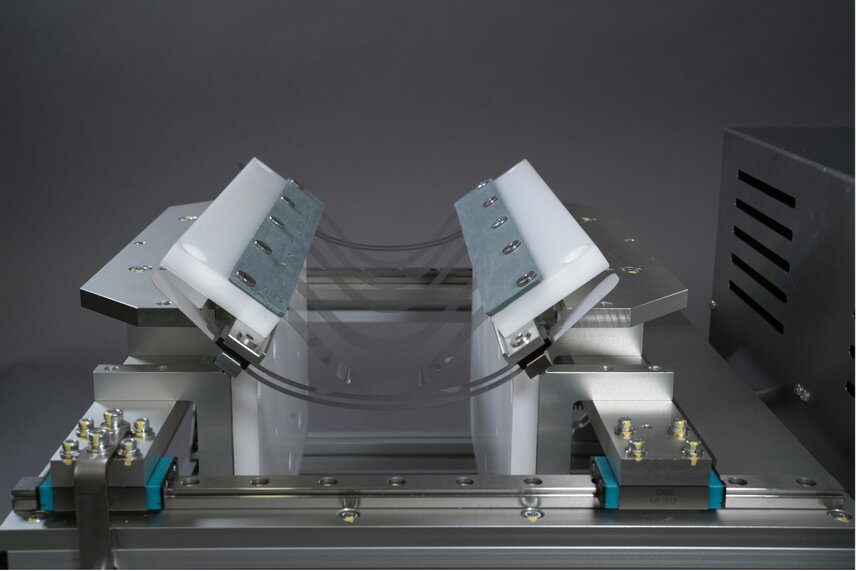
With the market launch of foldable displays, flexible glass entered mass production. Apart from that, ultra-thin glass with "thicknesses" of less than 0.1 mm is used in optics or microelectronics, but also in the consumer and automotive industries, e. g. for touch surfaces. To establish ultra-thin glass as an alternative to polymer webs for applications beyond foldable displays, adapted production processes must be developed. Emphasis is placed on avoiding cost-intensive production downtimes due to mechanical failure of the glasses. Indeed, the use of this innovative substrate material has been limited by the high demands of the processes by now.
For more than ten years, Fraunhofer FEP has been involved in the processing of ultra-thin glass, especially in the handling and the development of coatings.
Besides the coating process itself, cleaning and handling as well as defect detection in the uncoated and coated glass are essential for subsequent usability of the flexible glass. A publicly accessible technology platform for the consistent implementation of these steps did not yet exist.
This is the starting point for the joint research project Glass4Flex. In this project, new process technologies were developed to pioneer flexible glass applications for next-generation optical and/or electrical applications. Developers of such systems can now use the platform at Fraunhofer FEP. The process line includes an ultrasonic wet cleaning machine of the SCHMID Group, in which glass sheets can be cleaned inline. The researchers also have a white light interferometer of the Gesellschaft für Bild- und Signalverarbeitung (GBS) mbH at their disposal to monitor the cleaning and coating quality of the glass.
For further handling of the thin glass substrates of the project partner SCHOTT AG, a new transfer system of the Adenso GmbH was also installed. Under clean room conditions, the substrate can be transported contact-free by air cushion floating on a mobile cart. The electrostatic holder, so-called E-Chuck, of the ProTec Carrier Systems GmbH is already installed on this cart. The E-Chuck is then brought into the vertical position and ensures full-surface contact of the thin glass to the carrier in the coating and plasma treatment processes. This guarantees homogeneous thermal conditions with homogeneous mechanical stress and without any shadowing effects. After coating, reliability tests of the ultra-thin glass sheets can be carried out. Bayflex Solutions provided bending test equipment for this purpose as part of the CUSTOM project.
With the aid of the equipment provided, deeper insights into the edge strength and fatigue behavior of flexible glass were achieved. Together with researchers of the Fraunhofer Institute for Microstructure of Materials and Systems IMWS, Fraunhofer FEP researchers carried out extensive tests for this purpose. During these tests, the influence of selected coating and separation processes on the mechanical properties was investigated. The results can now be used to estimate parameter fields for the reliable handling of flexible glass more accurately, e. g., minimum winding radii before and after coating. By this, strength changes can be considered during processing. This increases the production yield because downtimes are avoided.
With the unique process line realized in the project Glass4Flex and the results from the project CUSTOM, scientists at Fraunhofer FEP are now able to safely handle and reliably process ultra-thin glass while taking thin film stress and glass strength into account. As of now, the researchers at the institute offer the new process capabilities for customer-specific projects ranging from coating and layer stack development to process adaptation for special customer requirements. In addition, the handling line is available as a technology platform, e. g. for feasibility studies and the development of innovative applications. The integration of lamination processes and process transfer up to pilot production is now also possible in individual projects.
The researchers will be present at the V2023 conference, September 19–20, 2023, at the Dresden Congress Center. They are available for further discussion and explanation of the process chain and the findings related to the projects CUSTOM and Glass4Flex.
As part of the Fraunhofer ElKaWe project, the Fraunhofer Institute for Electron Beam and Plasma Technology FEP has made significant …
The first Chemnitzer Seminar of the year 2025 is entitled “Test and Reliability Solutions – new opportunities for electronic components …
IVAM is part of the Skills4Chips project, a groundbreaking initiative supported by a €12 million investment over the next four …